A peculiar trait of cruel regimes down the centuries has long been their obsession with image. The most brutal, authoritarian and unaccountable of states pay a level of attention that borderlines on the obsessional to not merely how they are viewed by their own citizenry, but also by other states and powerful actors on the international stage.
Nowhere is this truer than in the Islamic Republic of Iran, where untold amounts of public cash are funneled every year into pro-regime, external-facing institutions that aim to bolster the regime’s fraught image overseas and advance the ideological principles it claims as a source of legitimacy.
These pro-Iran outfits extend not merely to media outlets such as Islamic Republic of Iran Broadcasting and the ubiquitous PressTV, but to online disinformation networks, cultural institutions and Iran-sponsored local organizations that – wittingly or unwittingly – have become a proxy for the Islamic Republic in their communities.
IranWire’s new series of articles aims to lift the lid on how pro-Islamic Republic propaganda manifests in different countries around the world. In partnership with local journalists, we’ll shed light on local support bases for the Iranian regime, how their narratives are spread and gain currency, and the sometimes devastating impact this has had on local democracies.
Our first article focused on the inroads made by Hezbollah and the Islamic Republic of Iran in Argentina. The second looked at the media alliance between the Islamic Movement of Nigeria and the Iranian regime. The third in the series, by Sarajevo-based writer Harun K, examines bastions of ideological support for Iran in Bosnia and Herzegovina.
The greater visibility of Islam in Bosnia and Herzegovina has caused a stir in both local and foreign media in recent years. Rightly or wrongly, on a number of occasions, the post-communist Islamic revival in the country has been associated with fundamentalism, radicalization, and even militancy. Most foreign analysts and journalists, however, have focused on Saudi and Turkish influence, while less attention has been paid to Iran’s growing presence in the country. This article aims to remedy that discrepancy.
Introduction: A Cry for Help
To understand the interest of foreign Islamic actors in Bosnia, we must turn back to the early 1990s and the genocide of Bosnian Muslims. This served as a rallying cry that united the Muslim world, bringing otherwise socially and politically divergent countries together, from secular Turkey to theocratic Iran, all the way to pluralistic Malaysia.
Many observers erroneously attribute the outbreak of war in Bosnia and Herzegovina solely to the country’s declaration of independence, and its recognition as such by the European community and the United States on April 6 and 7, 1992 respectively. Norman Cigar, the author of Genocide in Bosnia, notes that after Slobodan Milošević came to power as President of Yugoslavia in the 1980s, Serbian state controlled-media began broadcasting sensationalist features on the alleged Muslim massacres of Serbs during World War II, suggesting that the same threat had re-emerged. This propaganda, along with rising Serb nationalism, resulted in a growing anti-Muslim sentiment towards the end of the decade. As early as 1988 and 1989, at rallies organized by Milošević, Yugoslav Muslims were depicted as “new-day Ottomans” in an atmosphere of reincarnated historical animosity between Balkan Christians and Ottoman Turks.
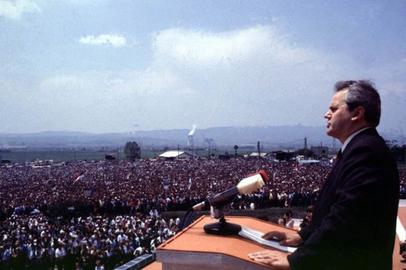
After Slobodan Milošević came to power as President of Yugoslavia in the 1980s, Serbian state controlled-media stepped up its propaganda
After attempts to draw a settlement acceptable to all three ethnic groups failed, the war in Bosnia and Herzegovina broke out in April 1992. The Army of the Serb Republic, along with the Yugoslav People’s Army (JNA) and Serb paramilitary troops, embarked on the systematic annihilation of the newly independent state and its Bosnian Muslim population. In almost every town and village overrun by these troops, the same pattern ensued: the segregation of Bosnian Muslims from Serbs, followed by the segregation of Muslim military-age men, which essentially included all males. More educated Muslim men, such as professors, engineers and religious and political leaders, were singled out and either executed immediately or sent to concentration camps where they were tortured, humiliated, starved and eventually murdered. David Rieff, author of Slaughterhouse: Bosnia and the Failure of the West, rightly describes this extermination of the Bosnian Muslim intelligentsia as “elito-cide.”
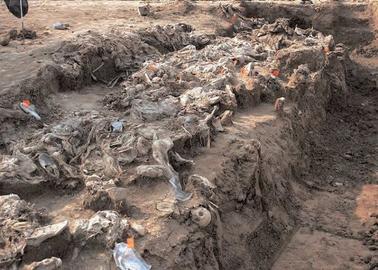
The Army of the Serb Republic, the Yugoslav People’s Army and Serb paramilitary troops embarked on the systematic annihilation of the Bosnian Muslim population
The Bosnian Muslim political leadership initially shuttled between Western capitals, pleading for powerful European countries and organizations to intervene and put an end to the war. The UN’s decision to place an arms embargo on Bosnia, ostensibly to prevent further fighting, ended up significantly constraining the ability of Bosnian Muslims to defend themselves. Paradoxically, the embargo was not placed on neighboring Serbia or Croatia, who were active parties in the conflict and who inherited the bulk of weaponry from the Yugoslav People’s Army.
Realizing that Western European states were uninterested in stopping the carnage, the Bosnian Muslim-led government, which was losing territory at an alarming rate, embarked on a mission to forge diplomatic alliances and arm itself by other means. Both it and the Islamic Community in Bosnia and Herzegovina, the institutionalized face of Islam in the country, now turned to Muslim majority countries for help.
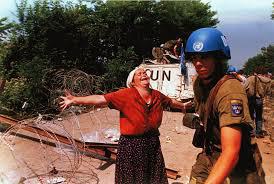
Countries around the world, including Arab states and Iran, sent aid workers to support the Bosnian Muslim population during the crisis
Since the Bosnian war had already been highly publicized throughout the Middle East, especially by the Emirati-owned Middle East Broadcasting Corporation (MBC) Company, which daily and bitterly publicized the plight of Bosnian Muslims, many Arab nations were fully aware of the situation in the country. As a result of this coverage and of the Islamic Community’s entreaties, the summer of 1992 saw the arrival of swathes of “Muslim brothers”: among them humanitarian workers, missionaries and fighters. The Muslim countries that answered the call included those in the Gulf states, Iran, Malaysia, Pakistan and Turkey.
Iranian Boots on the Ground in Bosnia
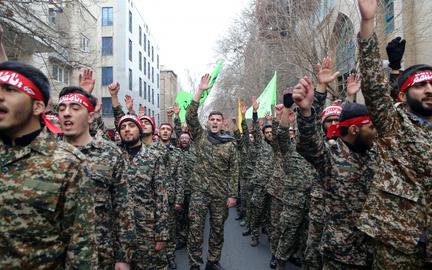
The Revolutionary Guard Corps sent weapons as well as military trainers and intelligence officers
The Bosnian government had quite literally begged Muslim states to help. It sought diplomatic support, which it mostly received in the form of official recognition of the newly-independent Bosnia and Herzegovina. The Bosnian government also sought money to help run the state and feed its population, which was provided by the wealthy Gulf states, mostly Saudi Arabia, the UAE and Qatar. Finally, however, the Bosnians also sought military aid.
It was here that Iran enthusiastically responded, with the Islamic Revolutionary Guard Corps sending tons of shipments of weapons as well as military trainers and intelligence officers. Iranian weaponry was of crucial importance to the beleaguered Bosnian administration and the IRGC instructors played a crucial role in training rag-tag Bosnian fighters in the early stages of the conflict.
Iran also deployed relief workers alongside the military instructors, who were mostly based in Visoko, Zenica and Sarajevo. The credibility they gained during the war enabled them to continue their activities in post-war Bosnia and Herzegovina – and to establish various institutions in the country that would serve to burnish the Iranian regime’s reputation in the country for decades to come.
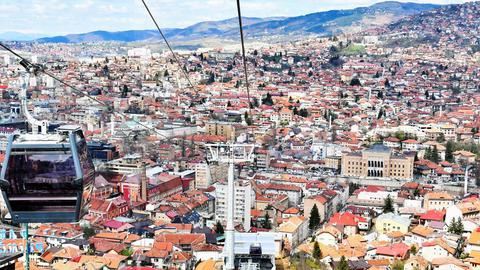
Iran also deployed relief workers alongside the military instructors, who were mostly based in Visoko, Zenica and Sarajevo
Pro-Islamic Republic Activity in Post-War Bosnia
In part a legacy from the bloody early 1990s, a number of pro-Iranian organizations remain active in Bosnia and Herzegovina even today. Some of them are demonstrably and unashamedly Iranian state-funded institutions. Others are non-governmental organizations that deny having any formal ties with Tehran, but judging by their activities still clearly serve to promote the policy interests of the Islamic Republic.
The IRIB (Bosnian language service)
The Islamic Republic of Iran Broadcasting’s (IRIB) Bosnian-language radio program is one of the most prominent Iranian state-funded propaganda organs in Bosnia and Herzegovina. Bosnian-language broadcasts began their ‘trial’ phase in May 1994 but developed significantly from 1996, in the post-war period. Their content today comprises mainly political and cultural news from Iran, as well as global news narrated from the perspective of the Iranian regime. The website, meanwhile, includes a section on Islam containing articles on daily prayers, human rights and philosophy from a Twelver Shia perspective.
Sahar TV
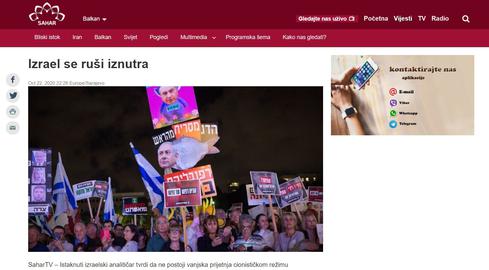
A Sahar Balkans article dated November 2020 declares Israel "on the verge of collapse"
Sahar Balkans, a wholly-owned subsidiary of the IRIB, officially began broadcasting in Bosnia and Herzegovnia February 1995. Like other Iranian media outfits, it flourished in the years following the end of the war and boasts of being “the only active Islamic international Bosnian-speaking network in the region (with a pivotal religious approach)”. Gradually it established close ties with local TV channels such as TV Vogošća, and TV Kakanj, which in turn broadcast Sahar’s programs.
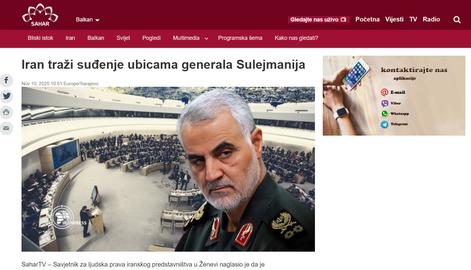
Sahar Balkans reports that Iran is seeking an inquiry into the killing of General Ghassem Soleimani in January
Sahar is primarily concerned with promoting a positive image of the Iranian regime. As well as waxing lyrical on Iran's history and culture, especially the supposed merits of the Islamic Revolution, it consistently re-packages Iranian regime narratives for Bosnian-language audiences under the guise of news coverage. Statements on global political changes and their impact on Iran are lifted verbatim from Iranian domestic media outlets: at the time of writing, among its top stories were those variously headlined “America’s Maximum Pressure Became Maximum Defeat”, “Israel is Collapsing From Within” and “Trump’s Political Life Ended with a Desire to be Invited from Iran”. Missives from Ayatollah Khamenei, the Supreme Leader of the Islamic Republic, are also re-published in full and without qualification. It seems Sahar TV's work centers around promoting the Islamic republic as a success story – one hampered by the “imperialist” US and its regional allies.
The Iranian Cultural Center

The Iranian Cultural Center
The Iranian Cultural Center is an arm of the Iranian embassy in Sarajevo. It opened during the war and moved to a much larger building just 10 days after the Dayton Accords were signed in December 1995, bringing an end to the conflict. Today the “Cultural Center of the IR Iran” is located on Ferhadija Street in the center of Sarajevo. Among its self-declared aims are to create public awareness on the principles and objectives of the Islamic Revolution in Iran, the “appropriate presentation” of Iranian culture and civilization, and “preparation of the necessary grounds for the unity among Muslims and the establishment of a united front among world Muslims”.
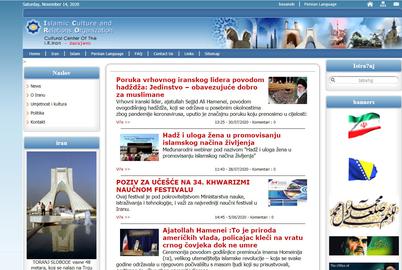
The "Cultural Center of the IR Iran" is located on Ferhadija Street in the center of Sarajevo
On the face of it, the center does indeed boast numerous cultural credentials. Since its foundation it has translated into Bosnian and published dozens of books on Shi’a Islam, Iranian literature, philosophy and Iranian history and culture, works closely with other Iranian institutions in Sarajevo and offers free Persian language lessons. But it also serves an undeniable political purpose. As well as celebrating Norooz (Iranian new year), every year the center hosts events to mark the anniversary of Ayatollah Khomeini’s death and publishes the speeches of both Ruhollah Khomeini and Ali Khamenei in its bookshop. The website, meanwhile, publishes articles not just on Islamic thought and heritage but advocating a combative stance toward the West and Iran’s other so-called enemies, recently calling on readers to “fight the virus of Zionism” and equating the killing of George Floyd to “the stance of the American government”.
BIRDS
The Iranian humanitarian organization BIRDS opened its Sarajevo office in 1997, with the then-aim of financing the reconstruction of Bosnia and Herzegovina and supporting the return of refugees. While the extent of its formal ties to the Iranian regime are not clear, part of BIRDS’ mission is to promote the religious principles of the Islamic Republic. Its website states: “The Islamic Republic of Iran has always paid particular attention to the destiny of Muslims and the weak in the world, and considers it a religious and a human duty [to help them]. Hence, in times of reconstruction and in times of war, it provides generous support to help resolve the difficulties faced by returnees, and has worked seriously in achieving conditions for their normal life.” The organization coordinates its projects with the Iranian embassy in Sarajevo as well as with the Bosnian state authorities, and has been active in providing agricultural support mainly to Bosnian Muslim returnees in Eastern Bosnia.
The Ibn Sina Institute
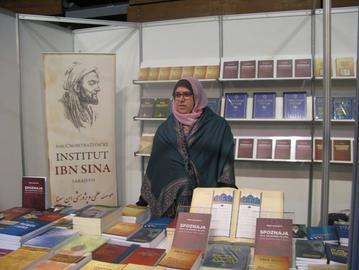
The Ibn Sina Institute has been in operation for almost 25 years
The nonprofit Ibn Sina Institute was founded in 1996 by a consortium of institutions and individuals from both Iran and Bosnia and Herzegovina. Its stated aim is to enhance cultural and academic exchange between the two countries. Over the decades the Sarajevo-based Institute has published numerous books on Islamic thought – including titles by Ayatollahs Khomeini and Khamenei, translated into Bosnian – and a high-quality journal called Znakovi Vremena (Signs of the Times). It has also hosted roundtable discussions on such topics as “the political dimensions of Imam Khomeini”, the role of religious institutions in resolving social problems, and a summit entitled “Where has the morality gone?” – the latter of which was duly promoted by the Iranian state-controlled news agency IRNA. While being an avowedly non-governmental organization the Ibn Sina Institute has close ties to the Iranian Embassy in Bosnia and Herzegovina, hosting regular ambassadorial visits. It celebrates the anniversary of the Iranian Revolution every February, with special monographs published to mark the 40th birthday of the Islamic Republic last year.
The Persian-Bosniak College

The college marks the anniversary of the Islamic Revolution every year
The Persian-Bosniak College in Lješevo is an affiliate of Iran’s Al-Mustafa International University, which maintains a network of Iran-backed educational institutions across the globe and invites thousands of foreign students to continue their studies in Iran every year. It was registered in August 1999 as a private institution and functions like an ordinary secondary school, with its entire curriculum in accordance with the Sarajevo Canton’s Educational program. Unlike other schools, however, it marks the anniversary of the Islamic Revolution every year with the singing of religious songs, theater plays, quizzes and games, and graduates are usually taken on a trip to Iran. In 2013, the then-Iranian Minister of Culture Mohammad Hosseini visited the school and pronounced it to his satisfaction, adding: “We are glad that we had an opportunity to help the Campus”.
The Mulla Sadra Foundation
In September 2003, Sheikh Akbar Eydi, an Iranian Islamic theologian with close links to the regime established an institution in Sarajevo called the Mulla Sadra Foundation. Similar to the Ibn Sina Institute, the Foundation concerns itself mostly with academic activities around such topics as Islamic philosophy and doctrine, and Islamic civilization. Akbar Eid is the Foundation’s in-residence, traditionally educated scholar who writes most of the books published by the Foundation which are then translated into Bosnian. The Foundation exclusively promotes Shia Islam, with all the fatwas related on its online “Questions and Answers” section in accordance with Shi’a interpretations of Islamic jurisprudence. It is thought to be a local branch of the Iranian Mulla Sadra International Society, a philosophical outreach mission funded by a bonyad – a quasi-governmental charitable trust in Iran – presided over by Ayatollah Khamenei himself.
Has Iran’s Government Succeeded in Ingratiating Itself in Bosnia and Herzegovina?
During the war, the Iranian regime sent humanitarian aid to Bosnia and Herzegovina and provided the Bosnian Army with much-needed weapons and ammunition. Such a gesture, at a time when no Western nation was willing to help the beleaguered Bosnian Muslims, enabled the Iranians to win the sympathies of ordinary Bosnian Muslims.
Iranian state-sponsored activity in Bosnia and Herzegovina significantly expanded in the immediate post-war years. Some of the subsequent institutions have challenged the prevailing Sunni school of Islam in Bosnia, while others entrenched themselves in the fabric of civil and educational life. The Iranian state amplifies pro-regime messaging in the country via a TV station (Sahar), a radio station (the IRIB), an academic institution dealing with Islamic philosophy and thought (the Ibn Sina Institute), a charitable organization preaching Shia Islam (the Mulla Sadra Foundation) and others.
All this has taken place, however, during a period in which the Iranian state has never managed to forge close ties with the government of Bosnia and Herzegovina. Diplomatic visits of any kind are extremely rare, with the last official visit by an Iranian head of state to Bosnia having taken place in 2005. There is no military cooperation between the two countries, as Bosnia now closely cooperates with and is trained by NATO and aspires to join this alliance in the near future. There are also no student exchanges at university level, save for a tiny number of students who attend Persian language proficiency courses in Iran. Bilateral trade and tourism is also very low.
It is also difficult to measure the impact of Iran’s numerous on-the-ground attempts to win over the hearts and minds of ordinary people in Bosnia and Herzegovina. Bosnian Muslim students still prefer to study in Germany, Austria or Turkey over Iran, and those that do graduate from Iranian universities often have trouble in the job market. Bosnian NGOs have found it far more fruitful to cooperate with European and American institutions than Iranian ones due to their larger budgets and greater resources.
In the post-war years, the Iranian regime made considerable inroads in building sympathy for the principles of the Islamic Revolution in Bosnia and Herzegovina. But now in 2020, there is little sign that the younger Bosnian generation is being swayed by Iran’s state-sponsored propaganda in their midst. If this was the intention, the Iranian government has not succeeded.
Read other articles in this series:
visit the accountability section
In this section of Iran Wire, you can contact the officials and launch your campaign for various problems





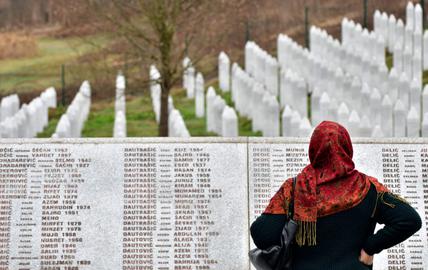
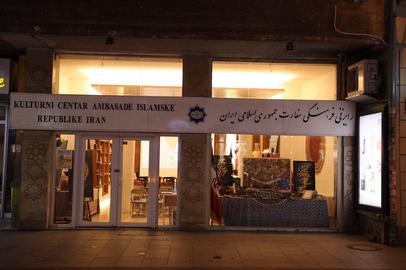



















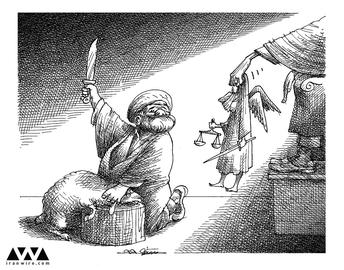
comments